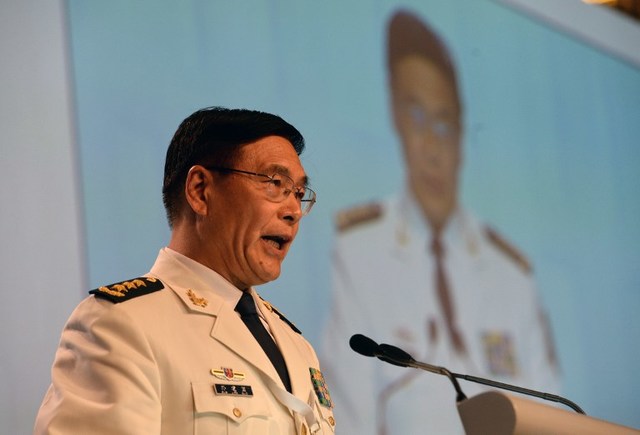
South-east Asian defence ministers called for greater cooperation and action among countries to dismantle the Islamic State in Syria and Iraq (ISIS) terrorist group on June 4, 2016.ST PHOTO: LIM YAOHUI
South-east Asian defence ministers on Saturday (June 4) called for greater cooperation and action among countries to dismantle the Islamic State in Syria and Iraq (ISIS) terrorist group and the persistent threat it poses to global security.
Calling the fight against ISIS “one of our greatest challenges today”, Malaysian Defence Minister Hishammuddin Hussein noted that the terror outfit cannot be defeated using a piecemeal approach or knee-jerk reactions.
“We need a different strategy, a more tailored approach that moves past outmoded forms of conventional warfare,” Mr Hishammuddin said at the Shangri-La Dialogue, an annual security summit for defence ministers, scholars and business executives from Asia-Pacific and beyond organised by the International Institute for Strategic Studies.
Military operations to destroy the group's logistic and financial strength “is a right action to weaken the central gravity of ISIS”, but that alone is not enough, said Mr Ryacudu.
Stressing that ISIS is not about religion, even as it cloaks itself in a warped version of Islam, Mr Ryacudu said that the terrorist group's message has managed to inspire various groups to conduct terrorism in their part of the world.
In South-east Asia, for instance, radical groups from the Southern Philippines, Malaysia, Indonesia, as well as Uighurs from China have been operating in the Sulu Sea in recent years, he noted.
“We can draw a conclusion that we face not only terrorism on the huge, international scale, but also that formed by...individuals and small groups from many countries,” said Mr Ryacudu.
To combat ISIS' virulent ideology, the Indonesian government has redoubled its national education efforts, with help from media and religious organisations. It is also collaborating with moderate religious groups to reintegrate those influenced by extremist ideology, he added.
Malaysia's approach has been to accelerate the sharing of intelligence between its home security and defence agencies through fortnightly National Security Council meetings, said Mr Hishammuddin, who urged more countries to adopt the practice.
“It's not easy because the threats are new...but it can be done if we share good practices with those going through (radicalism) around the globe, networking and sharing intelligence among different agencies,” he said, adding that security agencies “can no longer work in silos”.
There is also scope to expand cooperation in areas such as maritime security, said Mr Ryacudu, pointing to the release of 14 Indonesian sailors last month (May) by the Abu Sayyaf, a the militant group active in southern Philippines.
The group had kidnapped the men and held them for more than a month, and Mr Ryacudu said their release was the result of “successful cooperation between the Indonesian and Philippines governments”.
“We have to start thinking of a synergised approach among stakeholders between counterterrorism bodies and maritime security agencies,” he said.
http://www.straitstimes.com/asia/se-asia/south-east-asian-defence-chiefs-call-for-greater-cooperation-to-fight-isis








